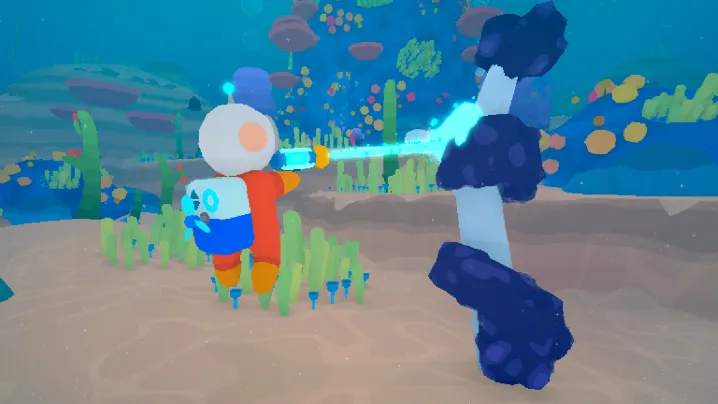In such a fantastic year for video games, plenty of titles go under the radar. Those games become hidden gems, and this month, Loddlenaut is one of the best ones you can find. It launched on November 16 to little fanfare, and that’s a shame. I enjoyed its Steam Next Fest demo a couple of months ago, and having now played the following game following its launch, it has become one of my favorite indies of the year.
In Loddlenaut, players control an interstellar janitor who comes to the ocean planet of GUP-14 to clean up all of the trash and gunk left behind by their employer, the GUPPI corporation. It’s a simple game about cleaning and being conscious of the mess you leave behind, and Moon Lagoon finds a surprisingly gratifying gameplay loop to reinforce that premise and theme. As a laid-back game that is as enjoyable to play via Steam Link or Steam Deck as it is on a PC, Loddlenaut is an indie hidden gem to check out over the holidays.
Cleaning up the mess you made
After arriving on GUP-14, I slowly but surely had to help the natural flora and fauna– whether that was fruit-baring plants of the aquatic Loddle animals that are the game’s namesake — take back this planet by cleaning up toxic goop and picking up trash sullying the beautiful landscape. Loddlenaut’s retro 3D art style is a perfect fit for this setup, as the minimalist detail of each object always makes it clear which things are toxic and foreign and need to be removed, even from a distance. And once all the gunk is cleared away, Loddlenaut can be quite a beautiful game.
Loddlenaut is technically about how it’s almost always up to the workers to clean up the messes that careless corporations leave behind. Although that’s a pretty depressing notion, Loddlenaut also ends up being a meditative and positive experience, highlighting the impact one can have when treating the planet they live on with a care that the megacorporations don’t. It actively tasked me with partaking in that in what I found to be one of the most satisfying gaming experiences of the year.

Those who’ve played PowerWash Simulator know the basic satisfaction that can come from slowly removing icky grime from a surface you know is beautiful underneath. Loddlenaut offers more of a sci-fi approach to that idea. The gameplay loops essentially have me discovering a new area I have to clean, picking up as much trash and clearing as many goops as I can until my inventory is full, returning to my home base to recycle the collected waste, use the resources from that to upgrade my abilities and craft new gadgets, and repeat this process until one of the areas of GUP-14 is clear.
Meanwhile, there’s an entirely optional Loddle raising system where players can find dirty Loddles while exploring, clean them up, and feed them so they grow. Loddlenaut’s runtime is short; it took me about four hours to beat. I felt like I was making meaningful progress every minute I played, which made the adventure entertaining from start to finish.
Loddlenaut also lacks a true fail state, as there are no enemies, and running out of oxygen just sent me back to home base and dropped some items that I had to go back and clean up. Oxygen drains slowly, and it’s easy to build a Recharge Ring that can refill oxygen levels, though, so Loddlenaut is a stress-free adventure. I found picking up trash until I maxed out my inventory space and then returning to home base to recycle it an extremely meditative process. That ensured the game was enjoyable no matter where I played it, whether that be PC, on my phone with Steam Link, or Steam Deck.

Valve has not officially verified Loddlenaut for Steam Deck yet, but I tested it on Valve’s handheld. Although the main menu requires the touchscreen to work correctly, once you’re in-game, there aren’t any significant issues. That’s a relief because Loddlenaut is a perfect fit for handheld play as it can easily be played in short bursts but still gives the feeling that meaningful progress is made in a session. It’s not a very intensive game, making it an excellent fit to relax and play on Steam Deck, possibly as you hang out with family or friends and relax after Thanksgiving dinner.
Even if you’re not celebrating that holiday this week, Loddlenaut is still a hidden gem of an indie that will appeal to those who love the simple yet satisfactory appeal of games like PowerWash Simulator. After such a hectic year for video games, I’ve come to appreciate games like Jusant and this that have a charming aesthetic, are fun to play, and allow me to decompress and not think about much else other than what’s on the screen in front of me. While you probably haven’t heard of Loddlenaut, you should have.
Loddlenaut is available now for PC.



